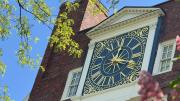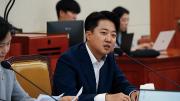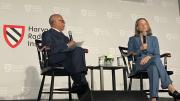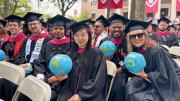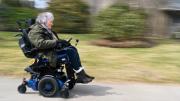Separately, at the May 2 meeting, FAS members adopted changes to the Harvard College Handbook for Students for the 2017-2018 academic year—an annual routine. “In keeping with the University’s articulation of belonging and inclusion,” gendered pronouns will be rendered gender-neutral. Other passages concerned Expos, advanced standing, email accounts and email privacy, and the new gen-ed requirements (with a caveat: “Until the new Quantitative Facility requirement is finalized and takes effect, students must complete the current Empirical Mathematical Reasoning requirement”). Separate language addressed marijuana (given the Massachusetts law permitting recreational use for adults); smoking (of tobacco, including vaping); and final examinations in absentia.
But the Handbook remains silent about the controversial new policy on student membership in unrecognized single-gender social organizations (USGSOs, such as final clubs, fraternities, and sororities), the subject of divisive FAS debate for most of the year (see “Social-Club Saga,” May-June, page 18). It denies members of USGSOs the required College recommendations for prestigious scholarships and fellowships, and prohibits leadership positions in recognized clubs and athletic teams. Students who seek such recommendations or leadership positions must affirm that they do not belong to such groups. Alleged untruthfulness would be subject to review by the Honor Council, created by the faculty to hear cases of academic misconduct (cheating on examinations, plagiarism, and so on).
Both the policy and its implementation are under review, but for now, it remains in effect for freshmen arriving this August. They would not join USGSOs during their first months on campus, in any event—but they would still be affected by the rule because the affirmation requires that students attest that they have not been a member of a USGSO for a year prior to assuming a leadership role or accepting a scholarship, and that they will not join a USGSO in the year following. Pending the outcome of the policy review, these matters may come before FAS again in the fall—an outcome most faculty members would probably like to avoid.



